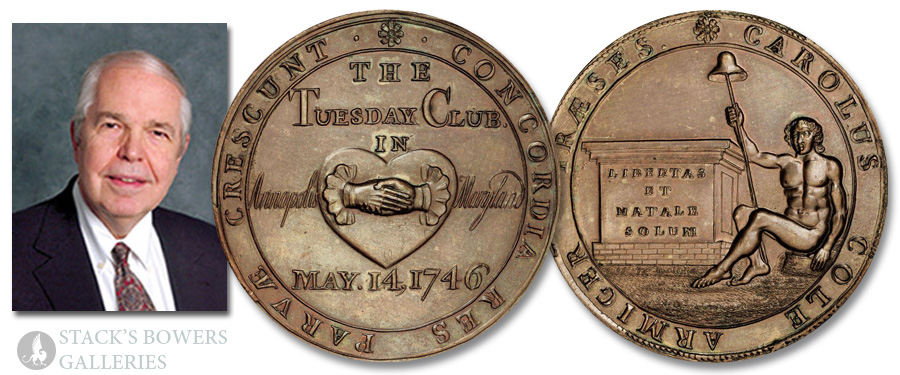
Recognized as a great rarity today is the membership medal of the Tuesday Club, a piece that revives the memory of life in the beautiful port city of Annapolis at the middle of the 18th century. On the Severn River near its entrance to the Chesapeake, the small village first settled in 1649 became the colonial capital in 1694. By the time the Tuesday Club formed in 1746, the city had become an economic hub of Maryland with a population surpassing 25,000. An 1886 essay by F.B. Mayer in Frank Leslie’s Popular Monthly recalls the era:?
In the halcyon days of the colonies, when tobacco returned a handsome profit, fashion, wit and learning found a centre here. The wealthy planters built substantial and embellished mansions framed in verdure, and with grounds terraced to the water, where their barges and boats, manned by liveried servants, were ready for ceremonial visits or exciting sport…The presence of official authority, the sharp definition of rank, and the existence of Negro slavery gave an aristocratic tone to society, and class distinction was as tyrannical and exact as in England… At the "Tuesday Club" were gathered the wits and classical scholars, who mixed their punch with Latin quotations, and conducted themselves with state and ceremony, all of which was duly recorded and illustrated.
The group held biweekly meetings called sederunts in each other’s homes, applying a set of exacting but lighthearted laws. One law made it mandatory to toast the health of the members’ wives and ladies, "immediately after supper and before any other toasts or healths go round." Another, called the "Gelastic Law," stated:
That if any subject of what nature soever be discussed, which levels at party matters, or the administration of the government of this province, or be disagreeable to the Club, no answer shall be given thereto, but after such discourse is ended, the Society shall laugh at the member offending, in order to divert the discourse.
In May of 1748, the members authorized the striking of a gilded silver keepsake that holds the record as America’s earliest club medal. Dr. Alexander Hamilton of Scotland, a founding member who later would write a 1,900-page History of the Tuesday Club, created the design and the dies were cut in London, possibly by John Kirk (according to C. Wyllys Betts), at a cost of 6½ guineas.
The Tuesday club medal’s legends indicate what was most important to the group. CONCORDIA RES PARVAE CRESCUNT, which roughly translates to "happily joining like-thinking fellows" and "LIBERTAS ET NATALE SOLUM" means "liberty and homeland only." CAROLUS COLE of the obverse legend was Charles Cole, the club’s first president.
The Tuesday Club disbanded in 1756.





